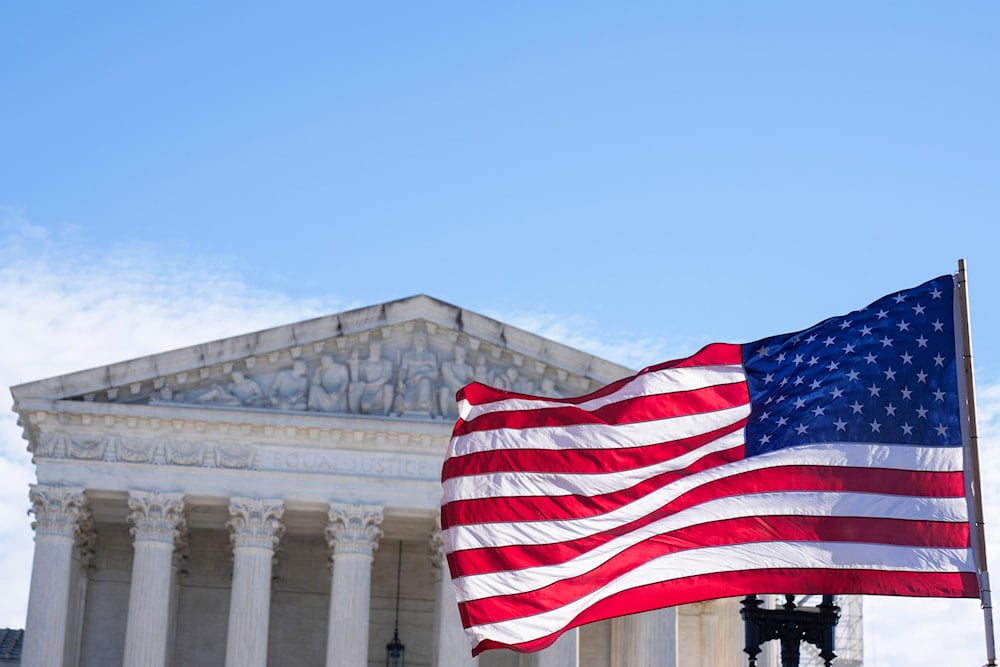US Supreme Court blocks Trump's deportation of Venezuelan migrants
The United States Supreme court temporarily blocked the government from using the obscure Alien Enemies Act to deport immigrants.
-
 The US Flag flies in front of the US Supreme Court, Wednesday, Dec. 4, 2024, on Capitol Hill in Washington (AP)
The US Flag flies in front of the US Supreme Court, Wednesday, Dec. 4, 2024, on Capitol Hill in Washington (AP)
In a dramatic late-night decision on Saturday, the US Supreme Court temporarily halted President Donald Trump's controversial move to deport Venezuelan migrants without due process using an archaic obscure law.
The US Supreme Court issued an emergency ruling in two terse paragraphs that temporarily blocked the government from continuing to expel migrants under the 1798 Alien Enemies Act, a law last used to round up Japanese-American citizens during World War II, while noting that two of the court's most conservative justices had dissented from the decision.
The unusual decision came after authorities prepared to expel dozens more Venezuelans late Friday under the Act which would have resulted in their deportation without meaningful opportunity to review evidence or contest their cases.
The Supreme Court announced that "the government is directed not to remove any member of the putative class of detainees from the United States until further order."
The American Civil Liberties Union, having spearheaded the legal effort to stop Friday's scheduled deportations, expressed approval of the Supreme Court's decision to intervene in the case.
"These men were in imminent danger of spending their lives in a horrific foreign prison without ever having had a chance to go to court. We are relieved that the Supreme Court has not permitted the administration to whisk them away the way others were just last month," Lee Gelernt, lead attorney, stated.
Through Trump's unprecedented application of the Alien Enemies Act, a statute previously invoked only during the War of 1812, World War I and World War II, migrants have faced deportation to El Salvador based on unproven allegations of gang affiliation while being denied both judicial review and formal criminal charges.
Attorneys representing several of the already-deported Venezuelans argued their clients were primarily targeted due to their tattoos, exemplified by the highly publicized case of Maryland resident Kilmar Abrego Garcia, who was deported to El Salvador's notorious mega-prison system without ever facing formal charges.
While the Trump administration initially acknowledged Abrego Garcia's deportation resulted from an "administrative error" in a larger group removal and was legally required to arrange his return, Trump reaffirmed his claims by asserting Abrego Garcia's gang affiliation and sharing a seemingly altered photo on social media that purported to show MS-13 tattoos on the migrant's knuckles.
US connected migrants to criminal gangs based on clothing, tattoos
Earlier this month, new court papers revealed that the Trump administration accused migrants of belonging to criminal gangs based on their clothing or tattoos.
In the court papers submitted, lawyers for the Venezuelan migrants produced a government document titled "Alien Enemy Validation Guide," which laid out a series of criteria that administration officials are required to meet to designate the men as members of Tren de Aragua, ensuring a comprehensive and detailed explanation of the process without concluding any thought prematurely.
Using the Alien Enemies Act, the White House ordered the expulsion of over 100 migrants, denying them any due process to contest the allegations.
The document outlined a scoring system to determine whether migrants were affiliated with the gang, commonly known as TdA, specifying that an individual needed at least eight points to be classified as a member. Under this system, any migrant who confessed to gang membership automatically received 10 points—immediately marking them as part of TdA and making them eligible for deportation under the Alien Enemies Act without further review.
Three weeks ago, Washington's Federal District Court Judge James E. Boasberg temporarily blocked the White House from using the law to deport Venezuelans, prompting the Trump administration to request the Supreme Court to pause the judge's order while it evaluates the case's legal merits.

 4 Min Read
4 Min Read









